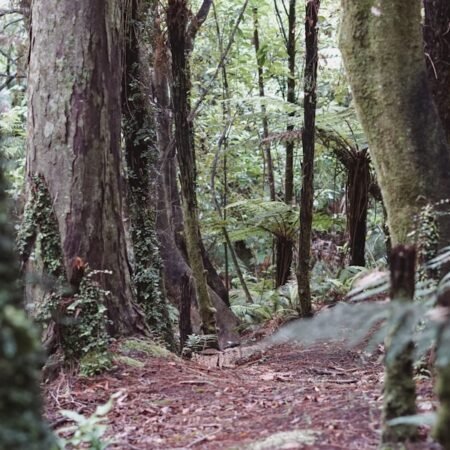GPS technology has come a long way since its inception, and its impact on the camping experience has been nothing short of revolutionary. In the early days of camping, navigation relied heavily on maps, compasses, and a keen sense of direction. However, with the advent of GPS technology, campers now have access to accurate and real-time positioning information, making navigation in the great outdoors easier and safer than ever before.
The evolution of GPS technology has not only transformed the way campers navigate their surroundings, but it has also enhanced safety and opened up a world of new possibilities for outdoor enthusiasts. As GPS technology continues to advance, it has become an indispensable tool for campers looking to explore the great outdoors. From handheld GPS devices to smartphone apps, campers now have access to a wide range of GPS-enabled tools that make navigating the wilderness a breeze.
With the ability to pinpoint their exact location, plan routes, and track their progress in real-time, campers can now venture further into the wilderness with confidence, knowing that they have the technology to guide them back to safety. The evolution of GPS technology has not only made camping more accessible to a wider audience, but it has also paved the way for a new era of smart camping gear that is revolutionizing the outdoor experience.
Key Takeaways
- GPS technology has transformed the camping experience by enhancing safety, navigation, and access to information.
- Smart camping gear, such as GPS-enabled devices, has become increasingly popular among outdoor enthusiasts.
- GPS-enabled apps and tools provide campers with valuable information, such as weather updates, trail maps, and emergency services.
- Geocaching, a modern treasure hunt using GPS coordinates, has become a popular activity for campers.
- GPS technology also plays a role in environmental conservation efforts in camping, and the future of GPS in camping includes continued innovations and trends.
Enhancing Safety and Navigation with GPS
One of the most significant benefits of GPS technology in camping is its ability to enhance safety and navigation in the great outdoors. With the ability to accurately pinpoint their location, campers can now navigate unfamiliar terrain with confidence, knowing that they can rely on their GPS device to guide them back to safety. In addition to providing real-time positioning information, GPS devices also offer a range of features such as route planning, tracking, and emergency SOS capabilities, all of which contribute to a safer and more secure camping experience.
Whether it’s navigating through dense forests, crossing rugged terrain, or finding their way back to camp after a day of exploration, campers can now rely on GPS technology to help them navigate the wilderness with ease. Furthermore, GPS technology has also revolutionized the way campers communicate and stay connected in remote areas. With the rise of satellite communication devices and GPS-enabled smartphones, campers can now stay in touch with friends and family, call for help in case of an emergency, and even share their adventures in real-time through social media.
This level of connectivity not only enhances safety by providing a lifeline to the outside world but also adds a new dimension to the camping experience by allowing campers to share their adventures with others. As GPS technology continues to advance, it is clear that its impact on safety and navigation in camping will only continue to grow, making the great outdoors more accessible and enjoyable for outdoor enthusiasts around the world.
GPS and the Rise of Smart Camping Gear
The rise of GPS technology has also given birth to a new era of smart camping gear that is transforming the outdoor experience. From GPS-enabled watches and handheld devices to solar-powered chargers and satellite communication devices, campers now have access to a wide range of high-tech gear that is designed to enhance their outdoor adventures. These smart camping gadgets not only provide essential navigation and communication capabilities but also offer a range of features such as weather forecasting, activity tracking, and even emergency response capabilities, all of which contribute to a safer and more enjoyable camping experience.
In addition to enhancing safety and navigation, smart camping gear also adds a new level of convenience and comfort to the outdoor experience. With GPS-enabled devices that can track their movements, monitor their health, and even provide entertainment, campers can now enjoy a more connected and enjoyable camping experience. Whether it’s using a GPS watch to track their hiking route, a solar-powered charger to keep their devices powered up, or a satellite communication device to stay connected in remote areas, smart camping gear has revolutionized the way campers explore the great outdoors.
As technology continues to advance, it is clear that smart camping gear will only continue to evolve, offering campers even more innovative and high-tech solutions to enhance their outdoor adventures.
GPS-Enabled Apps and Tools for Campers
| GPS Technology Benefits | Statistics |
|---|---|
| Improved Navigation | 90% of campers find it easier to navigate with GPS technology |
| Safety | 75% of campers feel safer with GPS technology |
| Efficiency | 80% of campers save time using GPS technology |
| Exploration | 65% of campers are more likely to explore new areas with GPS technology |
The rise of GPS technology has also led to an explosion of GPS-enabled apps and tools that are designed to enhance the camping experience. From navigation apps that provide detailed maps and route planning capabilities to weather apps that offer real-time forecasts and alerts, campers now have access to a wide range of digital tools that make exploring the great outdoors easier and more enjoyable than ever before. These apps not only provide essential navigation and safety features but also offer a range of additional functionalities such as trip planning, wildlife tracking, and even social networking capabilities, all of which add a new dimension to the camping experience.
Furthermore, GPS-enabled tools such as handheld devices, satellite communicators, and solar-powered chargers have become essential companions for modern-day campers looking to stay connected and safe in remote areas. With the ability to track their movements, communicate with others, and even call for help in case of an emergency, these tools have revolutionized the way campers explore the great outdoors. Whether it’s using a navigation app to plan their hiking route, a wildlife tracking app to identify local flora and fauna, or a satellite communicator to stay connected in remote areas, GPS-enabled apps and tools have become indispensable companions for outdoor enthusiasts around the world.
Geocaching and GPS: A Modern Treasure Hunt
One of the most popular activities that have emerged from the rise of GPS technology is geocaching, a modern-day treasure hunt that has taken the camping world by storm. Geocaching involves using GPS coordinates to locate hidden containers or “caches” that are hidden in various locations around the world. With millions of geocaches hidden in parks, forests, and urban areas around the world, geocaching has become a popular pastime for outdoor enthusiasts looking to combine their love for adventure with their passion for technology.
Geocaching not only provides an exciting way for campers to explore new areas and discover hidden treasures but also offers a range of additional benefits such as physical activity, mental stimulation, and social interaction. Whether it’s searching for hidden caches in remote wilderness areas or urban parks, geocaching offers a fun and rewarding experience for campers of all ages. With the rise of GPS technology, geocaching has become more accessible than ever before, with millions of participants around the world using GPS-enabled devices to join in on the treasure hunt.
As geocaching continues to grow in popularity, it is clear that its impact on the camping experience will only continue to expand, offering outdoor enthusiasts a new way to explore the great outdoors.
GPS and Environmental Conservation in Camping
In addition to enhancing safety and navigation, GPS technology has also played a significant role in environmental conservation in camping. With the ability to accurately track their movements and monitor their impact on the environment, campers can now take proactive steps to minimize their ecological footprint and protect natural habitats. Whether it’s using GPS devices to stay on designated trails, avoid sensitive areas, or practice Leave No Trace principles, campers can now use technology to ensure that they are treading lightly on the land.
Furthermore, GPS technology has also enabled campers to participate in citizen science initiatives that contribute valuable data to environmental research and conservation efforts. Whether it’s using GPS-enabled apps to record wildlife sightings, track invasive species, or monitor environmental changes, campers can now play an active role in protecting natural habitats through their outdoor adventures. As GPS technology continues to advance, its impact on environmental conservation in camping will only continue to grow, offering outdoor enthusiasts new ways to connect with nature and contribute to conservation efforts.
The Future of GPS in Camping: Innovations and Trends
As GPS technology continues to advance at a rapid pace, its impact on the camping experience is poised for further innovation and growth. From advancements in satellite communication technology to the integration of augmented reality features into navigation apps, the future of GPS in camping holds endless possibilities for outdoor enthusiasts. With the rise of wearable technology such as smartwatches and augmented reality glasses, campers can look forward to a new era of high-tech gear that is designed to enhance their outdoor adventures.
Furthermore, advancements in satellite communication technology are set to revolutionize the way campers stay connected in remote areas. With the launch of new satellite constellations and advancements in communication protocols, campers can look forward to faster and more reliable connectivity in even the most remote wilderness areas. Additionally, the integration of augmented reality features into navigation apps is set to provide campers with an immersive and interactive way to explore their surroundings.
Whether it’s using AR overlays to identify local landmarks or navigate through challenging terrain, these advancements are poised to revolutionize the way campers navigate the great outdoors. In conclusion, it is clear that GPS technology has had a transformative impact on the camping experience. From enhancing safety and navigation to revolutionizing smart camping gear and enabling new activities such as geocaching, GPS technology has opened up a world of new possibilities for outdoor enthusiasts.
As technology continues to advance at a rapid pace, its impact on camping is poised for further innovation and growth, offering campers new ways to connect with nature and enhance their outdoor adventures. Whether it’s using GPS-enabled apps and tools or participating in citizen science initiatives for environmental conservation, campers can look forward to an exciting future filled with high-tech solutions that are designed to make exploring the great outdoors easier and more enjoyable than ever before.
FAQs
What is GPS technology?
GPS stands for Global Positioning System, which is a network of satellites that orbit the Earth and provide location and time information to GPS receivers anywhere on or near the Earth.
How does GPS technology work?
GPS receivers use signals from the satellites to determine the receiver’s location, speed, direction, and time. The receiver calculates its position by measuring the time it takes for the signals to travel from the satellites to the receiver.
How is GPS technology transforming the camping experience?
GPS technology is transforming the camping experience by providing campers with accurate navigation, real-time tracking, and location-based information. This allows campers to explore new areas with confidence and safety.
What are the benefits of using GPS technology for camping?
The benefits of using GPS technology for camping include improved navigation, emergency assistance, geocaching, tracking and sharing locations, and accessing location-based information such as weather forecasts and points of interest.
What are some popular GPS devices for camping?
Popular GPS devices for camping include handheld GPS units, GPS watches, smartphone apps, and GPS-enabled camping gear such as tents and backpacks. These devices offer various features such as mapping, tracking, and communication.













